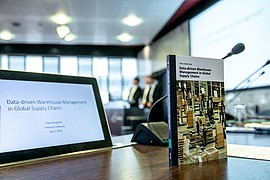PhD Defence: Thai Young Kim

In his dissertation ‘Data-driven Warehouse Management in Global Supply Chains’, Thai Young Kim focuses on how to solve warehouse challenges in global supply chain management (SCM) that is characterized by large volume uncertainty, great responsiveness needs and complex order-fulfilment collaboration with other functionalities.
Thai Young Kim defended his dissertation in the Senate Hall at Erasmus University Rotterdam on Thursday 5 July 2018 at 15:30. His supervisor is Prof. Rommert Dekker and his co-supervisor is Dr. Christiaan Heij. Other members of the Doctoral Committee are Prof. René de Koster (RSM), Dr Jan van Dalen, Prof. Kees Jan Roodbergen (University of Groningen), Prof. Dennis Fok (ESE), Prof Sander de Leeuw(Vrije Universiteit).
About Thai Young Kim

Thai Young Kim (1974) obtained his Bachelor’s degree in electrical engineering from Yonsei University in Seoul, South Korea in 2001. In 2007 he received his master’s degree in marketing communication at the same university. In 2010 he received another master’s degree in maritime economics and logistics from Erasmus University Rotterdam.
Thai Young proposed an external PhD project to prof.dr.ir. Rommert Dekker in 2012 and started work on various researches in the logistics area under supervision of prof.dr.ir. Rommert Dekker and dr. Christiaan Heij. He is senior manager of the logistic innovation department at Samsung Electronics Europe Logistics, The Netherlands., where he optimizes logistic cost and efficiency of European central distribution centers. He is also performing a consulting role for Samsung’s 25 warehouses of 13 European countries (316,000m2). His recent research interests are warehouse labor efficiency management, spare parts demand forecasting through installed base models, cross border e-commerce implementation and job shop modelling of warehouse order fulfilment operations. His work has been published in International Journal of Electronic Commerce, Computer and Industrial Engineering, and International Journal of Physical Distribution and Logistics Management.
During his PhD he presented his research at the Dutch expert group symposium including Bigdata from science to practice (hosted by Erasmus Q-intelligence), Service Logistics Forum (hosted by Dinalog).
Thesis Abstract

Warehouse management has emerged as a determinant for success of global supply chain management. This thesis focuses on how to solve warehouse challenges in global supply chain management (SCM) that is characterized by large volume uncertainty, great responsiveness needs and complex order-fulfilment collaboration with other functionalities. We employ data analytic methods to exploit the rich data information obtained from detailed registration of daily warehouse operations to address these challenges. By providing actual application examples in real-world situations we showcase the potency of such data-driven warehouse management.
In this dissertation, data-driven warehouse management is presented by four-steps in the time horizon of warehouse operations: Long-term opportunities (for the coming years) are examined by predictive analytics for expanding cross-border e-commerce in the European Union. Mid-term demand for spare parts during the end-of-life phase (of several months) are forecasted by means of data-driven modelling for installed base. Short-term operational opportunity (weekly or daily) are presented by employing detailed productivity data to sustain effective operation of variable warehouse resources. Real-time (hourly or shorter) data applications are introduced for job priority allocation to improve daily responsiveness in warehouse order fulfilment.
All these data analytic methods can be incorporated in warehouse management systems where practitioners can tune the specific strategies according to their warehouse constraints, including location cost, labour cost, time criticality, and freight company flexibility. In this way, data analytics at the warehouse level offers great opportunities for managing increasing uncertainties and performance requirements in global SCM.
Photos: Chris Gorzeman / Capital Images


